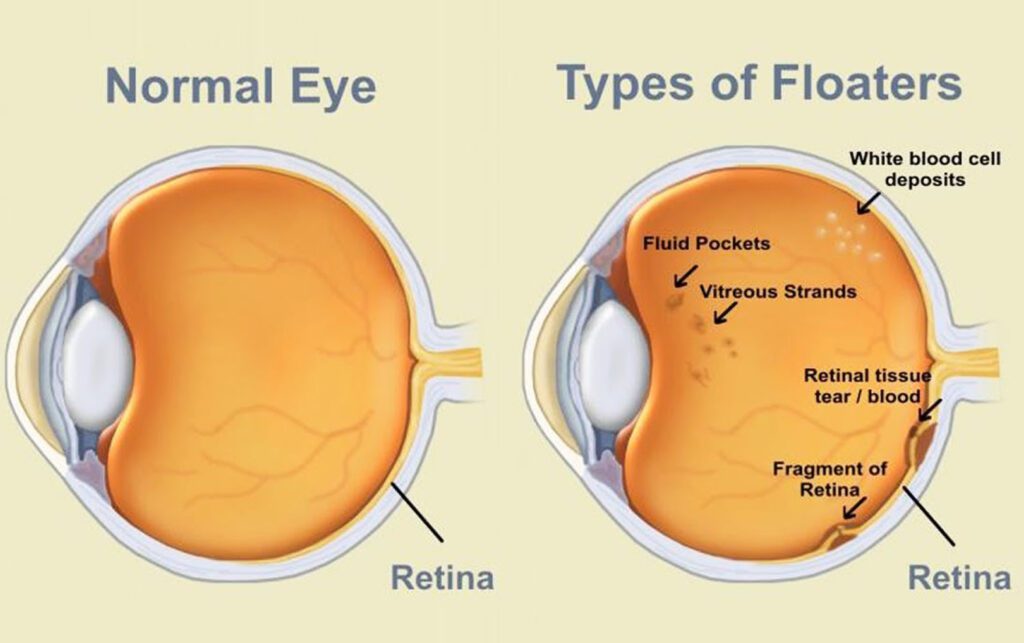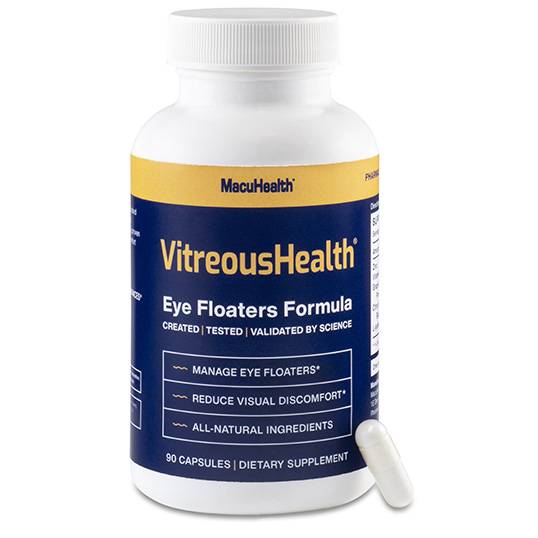Have you ever seen spots in your eye or tiny strings that disappear when you try to focus on them?
You could have eye floaters.
Eye floaters can be annoying for those who suffer from them, but they can also signify something more serious.
There is a new way to treat eye floaters using a natural health supplement, which has been scientifically proven to help reduce floaters.
Here is a guide to everything you need to know about eye floaters and the new treatment.
What Are Eye Floaters?
Eye floaters can be described simply as spots that appear in your vision. However, there are different kinds of spots that take on different shapes.
They tend to appear as dark specks, sometimes gray or black. However, they also appear as tiny strings. Sometimes they are even described as looking a bit like cobwebs.

Source: Wikipedia
You may not notice them all of the time. For example, those who suffer from eye floaters often find them more visible when looking at a white or bright surface like a wall.
Floaters are not fixed and seem to drift around as your gaze moves—hence the term ‘floaters.’ If you try to focus on them, they move away quickly. At other times, they appear to be hovering in your vision.
Eye Floater Symptoms
There are various symptoms you may experience if you are seeing floaters.
Floaters are essentially tiny shapes that appear in your vision. They do not have a fixed shape and may appear as specks or strings that are often gray and transparent.
These floaters move around and appear to be floating, especially when you try to look at them directly. They will move when you shift your gaze and disappear out of your line of vision.
You may find that they become more visible when you look up at the sky or a plain background. But, on the other hand, you may not notice them as you go about your day.
Primary Cause of Eye Floaters
The primary cause of eye floaters is simply the natural aging process. As people age, they experience changes in the vitreous, which can increase floaters.
The vitreous in your eyes is made primarily of water and has a soft texture. But, as well as water, it is made of collagen and hyaluronan. It fills the space between the retina and the lens and helps keep the eye’s round shape.
But the vitreous can change over time. As the years go by, it can liquify and contract. This can force it to move away from the inside of the eyeball.

Source: Health Jade
When this happens, collagen fibers form into strings and clumps inside the vitreous. These then block the light coming into the eye and, as a result, form shadows on the retina. You then see these shadows moving around on the eye, which are the floaters.
Other Eye Floaters Causes
As seen, aging is the main cause of eye floaters. However, other factors could present this issue. In some extreme circumstances, you could get eye floaters for the following reasons also:
1. Torn Retina
When the vitreous contracts and pulls on the retina, this can lead to retinal tears, which are very serious. If you do not get the tears treated, fluid can leak behind the tear, and the retina can separate from the back of the eye.
Retinal detachment is very serious. If retinal detachment is not treated, it can lead to permanent loss of vision.
2. Inflammation
Inflammation can be another cause of eye floaters. This inflammation can occur on the back of the eye on the choroid, which is part of the uvea. This type of inflammation is called posterior uveitis. It has various causes, including infection and inflammatory diseases. This affects both the choroid and the retina and can also cause the appearance of floaters.
3. Bleeding
Blood entering the vitreous can cause the appearance of eye floaters. This has several potential causes, including diabetes, high blood pressure, and injury. In this case, blood cells cause the eye floaters that appear in the vision.
4. Medications
When injected into the vitreous, certain eye medications can form air bubbles that look like shadows and take on the appearance of floaters. These floaters are usually temporary because the eye later absorbs the bubbles.
5. Surgery
Some surgeries can also cause eye floaters. For example, during cataract surgery, where silicone oil bubbles are added, these can take on the appearance of floaters. However, you must note that these might have already been there in this instance. If you have had cataract surgery to clear your vision, floaters might have already been there, and you just could not see them.
Who Gets Eye Floaters?

As mentioned, eye floaters are primarily a problem related to aging. As such, age is one of the biggest risk factors, and people over 50 tend to get more eye floaters than younger people.
Apart from aging, diabetes is one of the main health conditions that can increase the likelihood of eye floaters. Diabetic retinopathy is a condition where damage is caused to the retina’s blood vessels, which can cause floaters.
Eye injuries could also increase the chance of experiencing eye floaters. In addition, certain types of eye surgery can increase the chances of getting them. For example, floaters can be more likely to appear when complications arise during cataract surgery.
Also, people with nearsightedness are more at risk of getting floaters. This is due to the elongated form of the eye, which increases the possibility of the vitreous detaching from the retina.
Are Floaters Serious?
In most cases of age-related eye floaters, they are not too serious. However, that does not mean you should not get floaters checked out if you are experiencing them. If they start to bother you, it is always getting your eyes examined.
In addition, there are certain situations when you should always contact your optometrist or eye specialist immediately.
For example, if you experience a sudden appearance of new eye floaters or if you suddenly notice you have more than usual, always get your eyes checked.
If, in addition to your eye floaters, you experience any of the following, always get your eyes checked urgently:
- Light flashes in the eye
- Blurred vision
- A gray area blocking some of your vision
- Peripheral vision loss
These symptoms may be painless but could result from a retinal tear. As previously mentioned, this can be incredibly serious and requires immediate attention.
VitreousHealth: A New Solution for Eye Floaters

Source: MacuHealth
If you have ever heard someone tell you, ‘I cured my eye floaters,’ you may be interested in searching for a solution.
If your eye floaters are not related to a retinal tear or something more serious, and they are bothering you, there is a chance you can do something about them and reduce their severity.
In this case, you may be interested in VitreousHealth from MacuHealth.
MacuHealth has a long history of formulating successful treatments, and it developed VitreousHealth to help reduce the severity of eye floaters.
Launched in April 2022, VitreousHealth has been developed specifically to help people suffering from floaters. It is also the first formula to be scientifically proven to reduce the severity of eye floaters.
What Is It?
VitreousHealth is a non-invasive treatment for eye floaters in the form of a dietary supplement. It is the first to be scientifically proven to treat eye floaters.
Made with a patented blend of antioxidants, VitreousHealth nourishes the eye and protects against oxidative stress, which helps to reduce the appearance of floaters. In addition, all the ingredients are natural and free of lactose.
It is manufactured in the USA in a GMP facility and tested by third parties for safety and quality.
How VitreousHealth Helps
VitreousHealth reduces floater severity and improves contrast sensitivity and the visual experience. It does this by decreasing vitreous opacity while also decreasing discomfort.
The vitreous needs antioxidants to function properly. These protect from disease and oxidative stress. When the vitreous loses its nutrients, which can happen as we age, it can lead to floaters.
VitreousHealth helps sufferers to manage the condition by providing a natural option to reduce symptoms.
It is based on the Floater Intervention Study (FLIES), in which 67% of patients saw an improvement in their symptoms within six months, experiencing enhancement in visual comfort and contrast sensitivity.
Should You Try VitreousHealth?
If you are experiencing eye floaters, the first thing to do is get your eyes checked by an eye specialist.
As long as there are no serious underlying causes, like a detached retina, you may want to try VitreousHealth and see if it can help you get relief from your annoying eye floaters.Try VitreousHealth today.
As an Amazon Associate I earn a commission on qualifying purchases.
